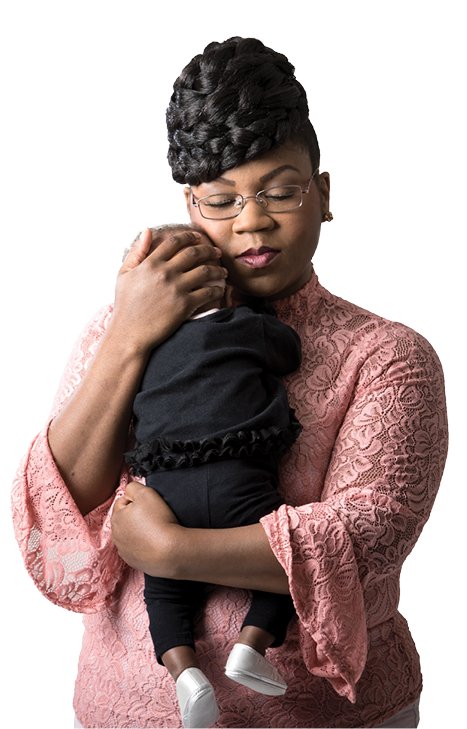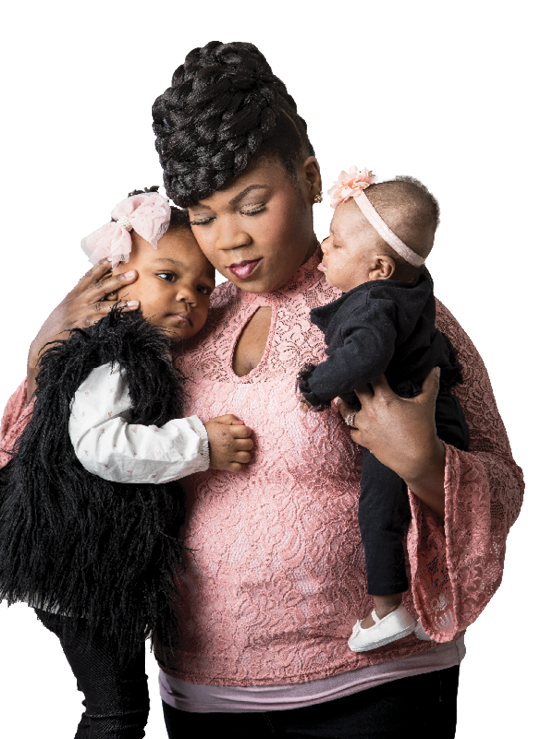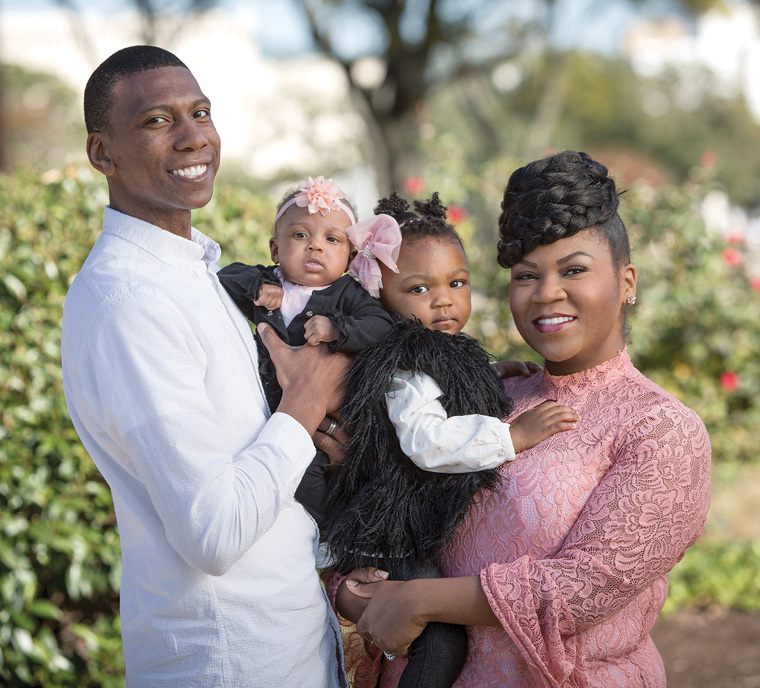
Because Chesapeake resident Shakeenah Moore was experiencing a high-risk pregnancy, an EVMS Maternal-Fetal Medicine specialist, Lea Porche, MD, was brought in to make sure all was well before she delivered her baby.
When Childbirth Is DEADLY
Pregnancy and childbirth are killing black women at an alarming rate. Here's
what EVMS is doing to help.
As soon as tennis superstar Serena Williams gave birth last year via emergency C-section, she stopped taking her anti-clotting medications so her surgical wound could heal.
Because Chesapeake resident Shakeenah Moore was experiencing a high-risk pregnancy, an EVMS Maternal-Fetal Medicine specialist, Lea Porche, MD, was brought in to make sure all was well before she delivered her baby.
As soon as tennis superstar Serena Williams gave birth last year via emergency C-section, she stopped taking her anti-clotting medications so her surgical wound could heal.
The next day, she struggled for breath. At first, her medical team assumed she was fine. Finally, she convinced them to do a CT scan. It showed the clots in her lungs that Ms. Williams suspected. Though she was immediately restarted on her medication, it didn’t avert a slew of emergencies, including a pulmonary embolism and abdominal hematoma, according to national news reports.
Fortunately, Ms. Williams recovered. Unfortunately, her experience is not unique.
Nationally, black women are 243 percent more likely to die from pregnancy or childbirth-related causes than white women. In Virginia, it’s worse. Black women are 300 percent more likely to die in childbirth than white women, reports the Virginia Department of Health.
Celebrity, education and socioeconomic status don’t matter. “Black, college-educated women who gave birth in hospitals were more likely to suffer complications than white women who didn’t graduate from high school,” says Amy Paulson, MPH, Instructor of Pediatrics and Director of the Consortium for Infant and Child Health (CINCH) based at EVMS.
That alarms Lauren Powell, MD, Director of the Virginia Department of Health’s Office of Health Equity. While other factors play a role in this health disparity, Dr. Powell says racism cannot be ignored.
“There’s biologically rooted evidence showing racism has an impact on health,” she says. “It’s important we talk openly about racism and its impact.”
Implicit Bias is Real
“Black, college-educated women who gave birth in hospitals were more likely to suffer complications than white women who didn't graduate from high school.”
Amy Paulson, MPH, Instructor of Pediatrics and Director of the Consortium for Infant and Child Health (CINCH) based at EVMS

India Corneilus considers herself lucky because she had insurance and resources available during her high-risk pregnancy with daughter Belize. "It's scary to see that so many black women are dying doing something that is supposed to be safe and natural.
A matter of trust
Katrice Smith-Newsome speaks from experience about why this is a critical issue for black women. A patient of Sharon Sheffield, MD (MD ’92, Obstetrics and Gynecology Residency ’97), Instructor of Obstetrics and Gynecology at EVMS, Ms. Smith-Newsome has seen Dr. Sheffield in her Franklin medical practice for decades, including during her two pregnancies.
“We’ve built a bond,” Ms. Smith-Newsome says. “I trust her.”
Both of Ms. Smith-Newsome’s pregnancies were high-risk. Before getting pregnant, she had diabetes and high blood pressure, and during both pregnancies, she developed pre-eclampsia.
Late in her first pregnancy, pre-eclampsia kept her on bed rest. A nurse stopped by daily to check her blood sugar, blood pressure and weight.
“One day the nurse came to the house and everything seemed OK,” she says, “but my pre-eclampsia blood work said something different. Dr. Sheffield called and said I needed to get to the hospital right away. I’m glad she did. If she hadn’t, maybe I wouldn’t have my son.”
Dr. Sheffield also runs EVMS’ rural obstetrics rotation, which enables third-year medical students to provide women’s healthcare under her supervision. “It’s a way we can make young doctors-in-training aware of the need for healthcare access in rural areas,” she says.
EVMS students also learn about maternal health through the school’s service-learning program, which just added a new option: Mothers and Baby Mermaids. Each student is assigned to a mother on Medicaid, who agreed in advance to have a student help her navigate pregnancy and the healthcare system.
Mothers and Baby Mermaids is led by Gloria Too, MD, Assistant Professor of Obstetrics and Gynecology. Not only will her students get clinical OB-GYN experience and partner with women in their pregnancies, she says, but they’ll also learn what patients on Medicaid go through.
“Even experienced people find the system confusing,” Dr. Too says.
Don Robison, PhD, is Director of Service Learning and Assistant Professor of Family and Community Medicine. “Students will be able to recognize emergencies, complications, stages of labor and postpartum depression,” Dr. Robison adds. “They’ll go with mothers to medical appointments and help solve problems she might encounter, even insurance questions or transportation issues.”

EVMS Minus 9 to 5 and Loving Steps, two grant-funded programs based at EVMS, coordinate community resources that support the health of mothers and their babies.
An issue of access
It’s likely that some of those women will make their first trip to a healthcare provider in years. But most haven’t skipped out on purpose. Seeing a doctor can be difficult for women who don’t have adequate health insurance, transportation, childcare or work coverage.

India Cornelius has given birth to two healthy children, Asia and Belize, despite having a high-risk pregnancy with her youngest. As a new Norfolk resident, Ms. Cornelius found helpful resources through Loving Steps, a Healthy Start program based at EVMS.


EVMS clinicians also collaborate with area hospitals to help standardize the quality of healthcare across the region. The Ob Right program is an example. A nationally recognized patient-safety initiative, it grew out of a goal to improve safety practices for women, says Alfred Abuhamad, MD, the Mason C. Andrews Chair in Obstetrics and Gynecology, Vice Dean for Clinical Affairs and Professor and Chair of Obstetrics and Gynecology at EVMS.
The Stakes Are High
Nationally, black women are 243 percent more likely to die from pregnancy- or childbirth- related causes than white women.
In Virginia, it's worse. Black women are 300 percent more likely to die in childbirth than white women.
Their own best advocate
Emergencies can happen whether a pregnancy is high- or low-risk. And time lost may mean life lost. “We need to have staff trained in early triggers and managing them,” Dr. Abuhamad says. “Identification of complications and aggressive intervention to treat them has consistently been shown to save lives.
“Birth is a natural, healthy event the majority of the time,” he continues. “But when things go wrong, they can go wrong very quickly.”
To that end, pregnant women have a role, too. They need to recognize what to be aware of, like the warning signs of high blood pressure, hemorrhage, heart failure and blood clots.
Even simple complaints may signal bigger problems. “When a pregnant woman says she has a headache,” Dr. Sheffield says, “you can’t blow it off.”
Dr. Porche agrees. “There are normal things that happen during pregnancy,” she says. “For example, most people will get some sort of swelling in their lower extremities. But there can be a lot of variation. I tell each patient, ‘You know yourself better than I do. If you think something’s not right, be persistent.’”
The simple message: Be like Serena — not a world-class athlete, but your own best advocate.

The Cornelius family — Darian, Belize, Asia and India — are all smiles today. But when the Navy transferred the family to Norfolk in 2017, they were concerned about Ms. Cornelius' high-risk pregnancy. Fortunately, there were no complications.

Photography by Eric Lusher and Doug Gardner.




